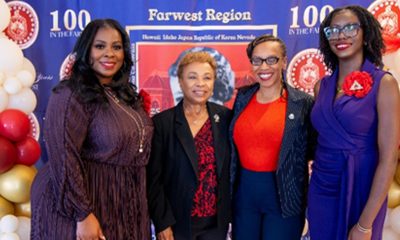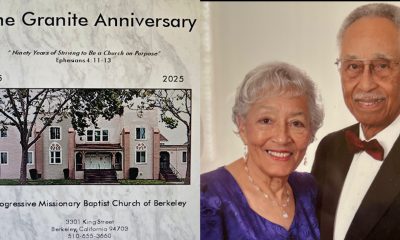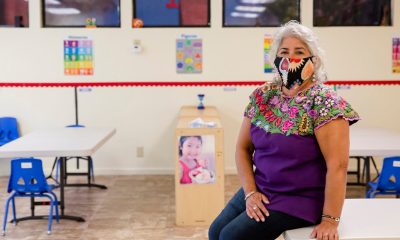Arts and Culture
Life Stories of Early African American UC Berkeley Faculty
By Cathy Cockrell, UC News
In 1942 a young African American Ph.D., David Blackwell, interviewed for a teaching job in UC Berkeley’s math department. He got a job at Berkeley, but not for many years.
< p>When finally invited to join the statistics faculty in 1952, several of Blackwell’s new colleagues told him there was a backstory to his failed application a decade earlier.
It had been decided to offer him a position, they said, but the wife of the departmental chair, who sometimes invited the faculty to dinner, insisted she would not have a Black person in her house — and the offer was squelched.
Blackwell, who eventually became the first tenured Black professor in the University of California system, shares this vivid memory in a 10-hour interview with the Bancroft Library’s Regional Oral History Office (ROHO).
His life history is part of a recently completed oral-history series on 18 pioneering African American faculty and senior administrators, hired before the advent of affirmative-action policies in the 1970s, who broke barriers and laid the groundwork for those who followed.
Twelve years in the making, the series involves more than 250 hours of interviews, tracing the subjects’ life journeys and recounting transformative events, such as the Third World College Strike of 1969, which led to curricular and institutional changes at Berkeley that reverberated across the nation.
The oldest of the interviewees is dramatic-arts lecturer Henrietta Harris, born in 1916. Blackwell was born in 1919 and died in 2010.
The interviews shed light on the courage involved in being a pioneer and role model, the role of historically Black colleges, and how the interviewees’ lives intersected with major historical events and figures, says Neil Henry, ROHO interim director and associate professor of journalism.
He notes that some pioneering colleagues — among them Barbara Christian (African American studies), O’Neil Ray Collins (botany), Harry Morrison (physics), William Shack (anthropology), Kenneth Harlan Simmons (architecture) and Staten Wentford Webster (education) — passed away before they could be included in the project.
A number of the interviewees, now in their 70s and beyond, were on hand for a historic reunion in the Morrison Library May 16, which happened to be the eve of the 60th anniversary of Brown v. Board of Education, the Supreme Court decision outlawing segregation in public education, which figures large in the lives of many of those gathered.
“This is a party we’ve been waiting 12 years to have… There couldn’t be a better day to have this celebration,” said Bancroft director Elaine Tennant.
Both Russ Ellis, professor emeritus of architecture and former vice chancellor of undergraduate affairs, and keynote speaker Patricia Williams, legal scholar and Nation columnist, spoke of the joy of reading interviewees’ words. The life stories serve as “a lens through which we can better understand what needs to be done for the next generation’s survival,” Williams said.
Chancellor Nicholas Dirks, a historian as well as anthropologist, predicted the series will become one of ROHO’s “most important and enduring” contributions.
Honorees present included, among others, composer Olly Wilson, professor emeritus of music and one-time faculty assistant for affirmative action; Chancellor’s Professor Troy Duster, professor emeritus of sociology; Mary Lovelace O’Neal, professor emerita of art practice; and Harry Edwards, professor emeritus of sociology, whose activism led to the black-power salute protest by two African American athletes at the 1968 Summer Olympics.
Library exhibit
Following formal presentation of the completed oral histories, each bound in blue, interviewees were invited to view “The Originals,” an exhibition showcasing photos and excerpts from the project, on display in the Rowell Cases, located in the Bancroft-Doe corridor, through August.
The series website includes complete transcripts and video excerpts of the oral-history interviews: http://bancroft.berkeley.edu/ROHO/projects/aa_faculty/
Caption: Mathematics and statistics instructor David Blackwell, hired in 1952, became the UC system’s first tenured African American professor. Photo courtesy of the Bancroft Library.
Advice
BOOK REVIEW: Let Me Be Real With You
At first look, this book might seem like just any other self-help offering. It’s inspirational for casual reader and business reader, both, just like most books in this genre. Dig a little deeper, though, and you’ll spot what makes “Let Me Be Real With You” stand out.

By Terri Schlichenmeyer
Author: Arshay Cooper, Copyright: c.2025, Publisher: HarperOne, SRP: $26.00, Page Count: 40 Pages
The hole you’re in is a deep one.
You can see the clouds above, and they look like a storm; you sense the wind, and it’s cold. It’s dark down there, and lonesome, too. You feel like you were born there — but how do you get out of the deep hole you’re in? You read the new book “Let Me Be Real With You” by Arshay Cooper. You find a hand-up and bring someone with you.
In the months after his first book was published, Cooper received a lot of requests to speak to youth about his life growing up on the West Side of Chicago, his struggles, and his many accomplishments. He was poor, bullied, and belittled, but he knew that if he could escape those things, he would succeed. He focused on doing what was best, and right. He looked for mentors and strove to understand when opportunities presented themselves.
Still, his early life left him with trauma. Here, he shows how it’s overcome-able.
We must always have hope, Cooper says, but hope is “merely the catalyst for action. The hope we receive must transform into the hope we give.”
Learn to tell your own story, as honestly as you know it. Be open to suggestions, and don’t dismiss them without great thought. Know that masculinity doesn’t equal stoicism; we are hard-wired to need other people, and sharing “pain and relatability can dissipate shame and foster empathy in powerful ways.”
Remember that trauma is intergenerational, and it can be passed down from parent to child. Let your mentors see your potential. Get therapy, if you need it; there’s no shame in it, and it will help, if you learn to trust it. Enjoy the outdoors when you can. Learn self-control. Give back to your community. Respect your financial wellness. Embrace your intelligence. Pick your friends and relationships wisely. “Do it afraid.”
And finally, remember that “You were born to soar to great heights and rule the sky.”
You just needed someone to tell you that.
At first look, this book might seem like just any other self-help offering. It’s inspirational for casual reader and business reader, both, just like most books in this genre. Dig a little deeper, though, and you’ll spot what makes “Let Me Be Real With You” stand out.
With a willingness to discuss the struggles he tackled in the past, Cooper writes with a solidly honest voice that’s exceptionally believable, and not one bit dramatic. You won’t find unnecessarily embellished stories or tall tales here, either; Cooper instead uses his real experiences to help readers understand that there are few things that are truly insurmountable. He then explains how one’s past can shape one’s future, and how today’s actions can change the future of the world.
“Let Me Be Real With You” is full of motivation, and instruction that’s do-able for adults and teens. If you need that, or if you’ve vowed to do better this coming year, it might help make you whole.
Alameda County
Bling It On: Holiday Lights Brighten Dark Nights All Around the Bay
On the block where I grew up in the 1960s, it was an unwritten agreement among the owners of those row homes to put up holiday lights: around the front window and door, along the porch banister, etc. Some put the Christmas tree in the window, and you could see it through the open slats of the blinds.

By Wanda Ravernell
I have always liked Christmas lights.
From my desk at my front window, I feel a quiet joy when the lights on the house across the street come on just as night falls.
On the block where I grew up in the 1960s, it was an unwritten agreement among the owners of those row homes to put up holiday lights: around the front window and door, along the porch banister, etc. Some put the Christmas tree in the window, and you could see it through the open slats of the blinds.
My father, the renegade of the block, made no effort with lights, so my mother hung a wreath with two bells in the window. Just enough to let you know someone was at home.
Two doors down was a different story. Mr. King, the overachiever of the block, went all out for Christmas: The tree in the window, the lights along the roof and a Santa on his sleigh on the porch roof.
There are a few ‘Mr. Kings’ in my neighborhood.
In particular is the gentleman down the street. For Halloween, they erected a 10-foot skeleton in the yard, placed ‘shrunken heads’ on fence poles, pumpkins on steps and swooping bat wings from the porch roof. They have not held back for Christmas.
The skeleton stayed up this year, this time swathed in lights, as is every other inch of the house front. It is a light show that rivals the one in the old Wanamaker’s department store in Philadelphia.
I would hate to see their light bill…
As the shortest day of the year approaches, make Mr. King’s spirit happy and get out and see the lights in your own neighborhood, shopping plazas and merchant areas.
Here are some places recommended by 510 Families and Johnny FunCheap.
Oakland
Oakland’s Temple Hill Holiday Lights and Gardens is the place to go for a drive-by or a leisurely stroll for a religious holiday experience. Wear a jacket, because it’s chilly outside the Church of Jesus Christ of Latter-day Saints, at 4220 Lincoln Ave., particularly after dark. The gardens are open all day from 9 a.m. to 9 p.m. with the lights on from dusk until closing.
Alameda
Just across the High Street Bridge from Oakland, you’ll find Christmas Tree Lane in Alameda.
On Thompson Avenue between High Street and Fernside drive, displays range from classic trees and blow-ups to a comedic response to the film “The Nightmare Before Christmas.” Lights turn on at dusk and can be seen through the first week in January.
Berkeley
The Fourth Street business district from University Avenue to Virginia Street in Berkeley comes alive with lights beginning at 5 p.m. through Jan. 1, 2026.
There’s also a display at one house at 928 Arlington St., and, for children, the Tilden Park Carousel Winter Wonderland runs through Jan. 4, 2026. Closed Christmas Day. For more information and tickets, call (510) 559-1004.
Richmond
The Sundar Shadi Holiday Display, featuring a recreation of the town of Bethlehem with life-size figures, is open through Dec. 26 at 7501 Moeser Lane in El Cerrito.
Marin County
In Marin, the go-to spot for ‘oohs and ahhs’ is the Holiday Light Spectacular from 4-9 p.m. through Jan. 4, 2026, at Marin Center Fairgrounds at 10 Ave of the Flags in San Rafael through Jan. 4. Displays dazzle, with lighted walkways and activities almost daily. For more info, go to: www.marincounty.gov/departments/cultural-services/department-sponsored-events/holiday-light-spectacular
The arches at Marin County Civic Center at 3501 Civic Center Dr. will also be illuminated nightly.
San Francisco
Look for light installations in Golden Gate Park, chocolate and cheer at Ghirardelli Square, and downtown, the ice rink in Union Square and the holiday tree in Civic Center Plaza are enchanting spots day and night. For neighborhoods, you can’t beat the streets in Noe Valley, Pacific Heights, and Bernal Heights. For glee and over-the-top glitz there’s the Castro, particularly at 68 Castro Street.
Livermore
The winner of the 2024 Great Light Flight award, Deacon Dave has set up his display with a group of creative volunteers at 352 Hillcrest Avenue since 1982. See it through Jan. 1, 2026. For more info, go to https://www.casadelpomba.com
Fremont
Crippsmas Place is a community of over 90 decorated homes with candy canes passed out nightly through Dec. 31. A tradition since 1967, the event features visits by Mr. and Mrs. Claus on Dec. 18 and Dec. 23 and entertainment by the Tri-M Honor Society at 6 p.m. on Dec. 22. Chrippsmas Place is located on: Cripps Place, Asquith Place, Nicolet Court, Wellington Place, Perkins Street, and the stretch of Nicolet Avenue between Gibraltar Drive and Perkins Street.
Activism
Oakland Mandala: A New Event and Point of Beauty
Led by Oakland resident Mandisa Snodey, a group of artists conceived and painted the mandala on Linden street near McClymonds High School as part of a Black Friday event the day after Thanksgiving to support Black-owned businesses.

By Post Staff
The first annual Oakland Mandala, sponsored by Miges Odanes Village Center, Credo Studio, and the Mandala Medicine Movement is on view now until the winter rains wash it away.
Led by Oakland resident Mandisa Snodey, a group of artists conceived and painted the mandala on Linden street near McClymonds High School as part of a Black Friday event the day after Thanksgiving to support Black-owned businesses.
“This is a lineage-based community art project, using temporary paint, aimed at community building, neighborhood beautification, and celebration of the arts and all people’s creativity,” Snodey said. “The theme of this year’s mandala was ‘Unified Humanity.’
“We gathered at 7 a.m. on Friday for the Black Friday Block Party and finished painting close to sunset. Our youngest painter was 2 years old and our eldest close to 70 years young: we had families, community members, professional artists, and people who have never painted before all working together.”
Snodey urges residents to come visit and take a picture with the mandala. It’s located between 28th and 30th on Linden Street in West Oakland. If you post on social media, please use the hashtags “#oaklandmandala” and “#mandalamedicinemovement.”
Snodey extends special thanks to the Bay Area Mural Program (BAMP), Few and Far Women, “and other Bay Area Artists who participated and made this first annual mandala a beautiful success.”
-

 Bay Area4 weeks ago
Bay Area4 weeks agoPost Salon to Discuss Proposal to Bring Costco to Oakland Community meeting to be held at City Hall, Thursday, Dec. 18
-

 Activism4 weeks ago
Activism4 weeks agoMayor Lee, City Leaders Announce $334 Million Bond Sale for Affordable Housing, Roads, Park Renovations, Libraries and Senior Centers
-

 Activism4 weeks ago
Activism4 weeks agoOakland Post: Week of December 10 – 16, 2025
-

 Activism4 weeks ago
Activism4 weeks agoOakland School Board Grapples with Potential $100 Million Shortfall Next Year
-

 Activism4 weeks ago
Activism4 weeks ago2025 in Review: Seven Questions for Black Women’s Think Tank Founder Kellie Todd Griffin
-

 Arts and Culture4 weeks ago
Arts and Culture4 weeks agoFayeth Gardens Holds 3rd Annual Kwanzaa Celebration at Hayward City Hall on Dec. 28
-

 Advice4 weeks ago
Advice4 weeks agoCOMMENTARY: If You Don’t Want Your ‘Black Card’ Revoked, Watch What You Bring to Holiday Dinners
-

 Activism4 weeks ago
Activism4 weeks agoAnn Lowe: The Quiet Genius of American Couture























































